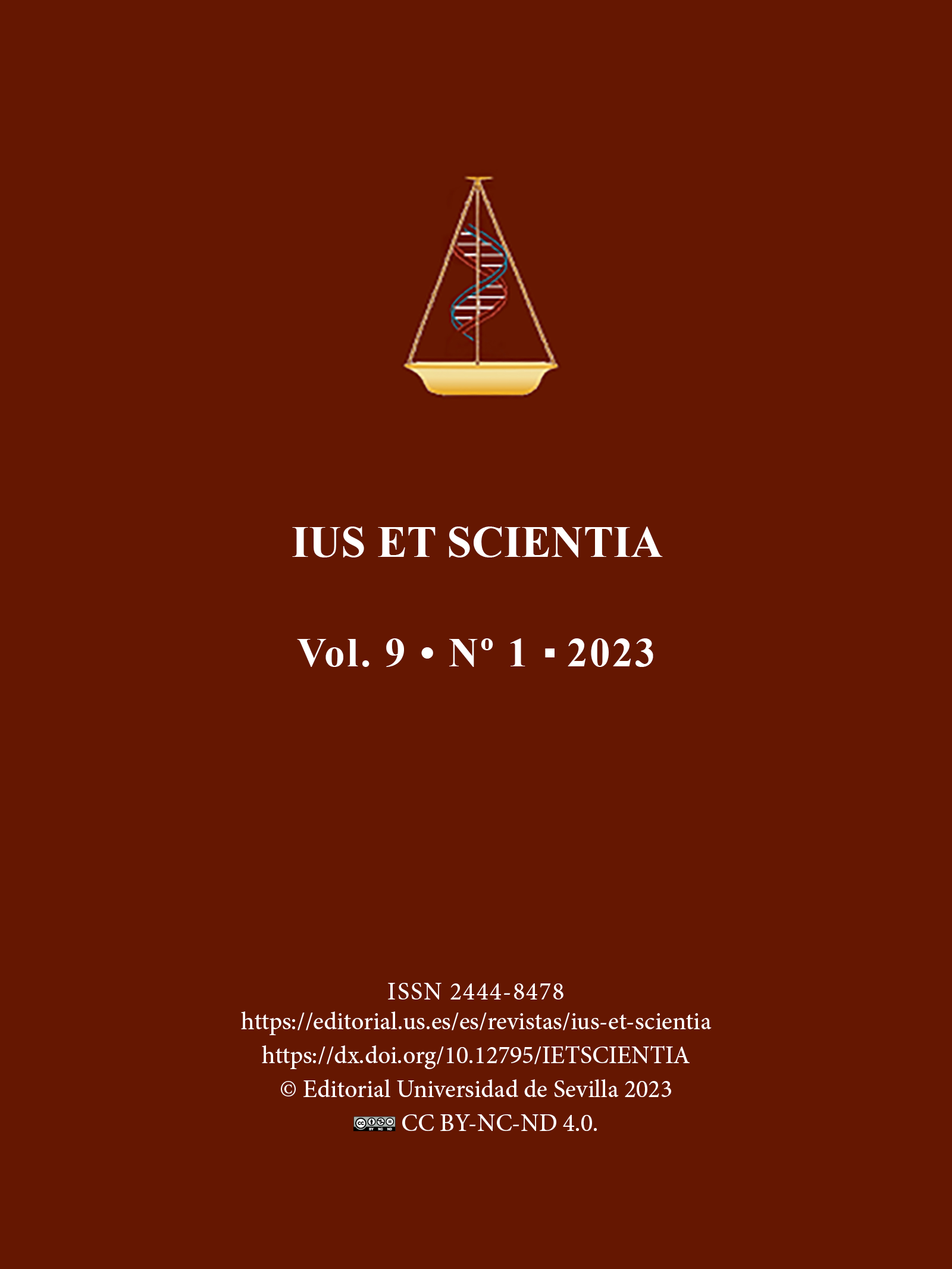The use of Artificial Intelligence in regulatory impact analysis the use of Artificial Intelligence in regulatory impact analysis
DOI:
https://doi.org/10.12795/IESTSCIENTIA.2023.i01.02Keywords:
Regulatory Impact, Assessment, Legislative quality, Artificial IntelligenceAbstract
The Regulatory Impact Analysis is currently implemented in several countries as a cutting-edge tool for improving the quality of the law. The opportunities to involve the virtuous methodology-technology binomial are analyzed to explore the potential of Artificial Intelligence in the regulatory field. The aim is to correct problems that affect legislation such as hyper-legislation, low quality of the law, hyposthenia and the hypertrophy of regulatory systems. The limitations and virtues of this evaluation methodology are discussed, to detect areas of opportunity for the use of Artificial Intelligence. It could support the contents projected by the legislative intervention, anticipating it’s possible impacts, so that laws are approved with less chances to fail.
Downloads
References
Almonacid, Juan Jorge (2022). Consulta participativa: Gran reto del Análisis de Impacto Normativo y la Inteligencia Artificial. Revista Pluralidad y Consenso, Instituto Belisario Domínguez, Senado de la República, México.
Almonacid, Juan Jorge y coronel, Y. (2020). Aplicabilidad de la inteligencia artificial y la tecnología blockchain en el derecho contractual privado, Revista de Derecho Privado, Universidad Externado de Colombia, n.° 38, enero-junio 2020, 119-142, doi: 10.18601/01234366.n38.05.
Atienza, Manuel (1997). Contribución a una teoría de la legislación, Madrid, Tecnos. Consultado en https://www.researchgate.net/publication/304543443_Contribucion_para_una_teoria_de_la_legislacion
Caf (2022) Conceptos fundamentales y uso responsable de la Inteligencia Artificial en el sector público. Informe 2, Banco de Desarrollo de América Latina.
Bronfman, Alan (2006). El sentido de la evaluación legislativa en los sistemas políticos democráticos. En: La evaluación de las leyes. XII Jornadas de la Asociación Española de Letrados de Parlamentos.
Caballero, Rafael (2020). Apuntes metodológicos para evaluar la efectividad de una ley. Boletín mexicano de derecho comparado, 52(154), 411-423. Epub 12 de mayo de 2020. https://doi.org/10.22201/iij.24484873e.2019.154.14148
Carceller, Julia (2019), Análisis de impacto normativo sobre derechos y libertades fundamentales. Papeles el tiempo de los derechos, número 5, p. 4. ISSN: 1989-8797 https://redtiempodelosderechos.files.wordpress.com/2019/01/derechos-libertadesfundamentales-5-19.pdf
Crick, Bernard (1968). En defensa de la política, Madrid.
De vrieze, Franklin (2017). Guía para el control post-legislativo de los parlamentos, WFD, Londres.
Ehrman, Roberto (2018). La evaluación de impacto legislativo: un programa para la mejora de los resultados de la legislación. Cuadernos de Ciudad de México.
Gellner, Ernest (1984) El rasgo científico de las ciencias sociales. Epistemology of Social Science, ISSJ Unesco Vol. XXXVI, No. 4, 1984
Maniaki, Alexia (2022). Experiencia desde el Parlamento Europeo en Evaluación de Impacto Normativo. En: Senado de la República (2022) Memoria del Primer Congreso Internacional en Análisis de Impacto Legislativo, Instituto Belisario Domínguez.
Matallana, Silvia. (2020). La construcción discursiva de la racionalidad jurídica. En Cáceres, Nieto, Enrique. Pasos hacia una revolución en la enseñanza del derecho en el sistema romano-germánico, tomo 5. https://biblio.juridicas.unam.mx/bjv/detalle-libro/6227-pasos-hacia-una-revolucion-en-la-ensenanza-del-derecho-en-el-sistema-romano-germanico-tomo-5-version-electronica
Parra, Dario, Concha, Ricardo (2021). Inteligencia artificial y derecho. Problemas, desafíos y oportunidades, Universitas, vol. 70, Pontificia Universidad Javeriana.
Reveles Vázquez, Francisco (2017). Problemas de la representación política y de la participación directa en la democracia. Estudios políticos (México), (42), 11-35. Recuperado en 24 de octubre de 2022, de http://www.scielo.org.mx/scielo.php?script=sci_arttext&pid=S0185-16162017000300011&lng=es&tlng=es.
Segura, Manuel (1998). La racionalidad jurídica, Madrid, Tecnos, 1998.
Valle-Cruz, D., Criado, I., Sandoval-Almazán, R. y Ruvalcaba-Gómez, E. A. (2020). Assessing the public policy-cycle framework in the age of artificial intelligence. From agenda-setting to policy evaluation. Government Information Quarterly, 37(4). https://doi.org/10.1016/j.giq.2020.101509.
Van ooijen, C. Ubaldi, B. y Welby, B. (2019). A data-driven public sector: enabling the strategic use of data for productive, inclusive and trustworthy governance. OECD Working Papers on Public Governance n.o 33. https://doi.org/10.1787/09ab162c-en
Weber, Max (1986). Sobre la teoría de las ciencias sociales, Barcelona, Ediciones Planeta-Agostini.
Published
How to Cite
Issue
Section
License
Copyright (c) 2023 Silvia Matallana

This work is licensed under a Creative Commons Attribution-NonCommercial-ShareAlike 4.0 International License.
Those authors being published in this journal agree to the following terms:
- Authors retain their copyright and they will guarantee to the journal the right of first publication of their work, which will be simultaneously subject to license recognition by Creative Commons that allows others to share such work provided it is stated the author’s name and his first publishing in IUS ET SCIENTIA.
- Authors may take other non-exclusive distribution license agreements version of the published work (e.g. deposit in an institutional digital file or publish it in a monographic volume) provided it is stated the initial publication in this journal.
- It is allowed and encouraged that Author s disseminate their work via the Internet (e. g. institutional digital files or on their website) prior to and during the submission process, which can lead to interesting exchanges and to increase citation of the published work.
- Abstract 444
- PDF (Español (España)) 361
- HTML (Español (España)) 468





